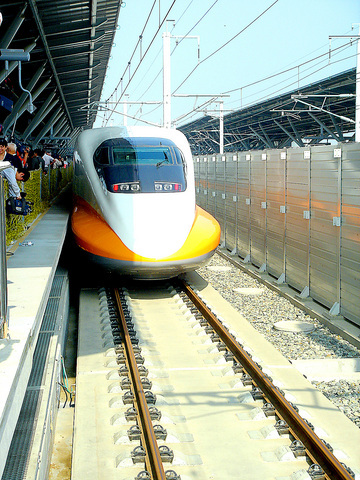After four months of delays, the Taiwan High Speed Rail Corp (THSRC) began its first test run of Taiwan's bullet train yesterday, hoping to begin regular service by the end of October, as orginally scheduled.
"Only months from now, people in Taiwan will see the trains flying along the west coast of Taiwan," said THRSC chairwoman Nita Ing (

PHOTO: JESSIE HO, TAIPEI TIMES
Over the next four to six weeks, THSRC will test the train on a 60km-track between Kaohsiung and Tainan, starting at the speed of 30kph, and then gradually gearing up to 120kph.
Kazuo Sato, chairman of the Taiwan Shinkansen Corp, who also attended the inauguration, said the train has passed tests running at 300kph in Japan, and that the company will help THSRC to resolve technical problems, allowing the train to roar along at the same speed on Taiwan's tracks.
The 700T train, based on the Japanese Shinkansen 700 Series, has been modified to accommodate Taiwan's environment, and has 12 carriages, including nine motor cars and three trailer cars that can carry a total of 989 passengers. THSRC has ordered 30 complete train sets, which will be delivered to Taiwan by the end of September.
THSRC has completed 78 percent of the 345km project, which connects the northern and southern parts of the country, but the progress seems to be slow, given the Oct. 31 deadline for completion that the company has set.
Ing was noncommittal as to whether the company can meet the deadline, saying: "As the leader of this project, I have to have confidence that it will be completed on time ... We can't predict the future, but we will try our best."
Formosa Plastics Group chairman Wang Yung-ching (
THSRC failed to meet its target of NT$7.5 billion (US$236.6 million) in investment by the end of last year, and is keen to find potential investors to resolve its burgeoning financial crisis.
According to Arthur Chiang (
Ing dismissed media reports that the Taiwan high-speed railway is a hybrid mix of Japanese and European systems with many safety concerns. Chiang explained that THSRC only uses larger turnouts -- a type of track structure necessary for switching to parallel rails -- made in Germany on four steep slopes, as required by the Taiwan High Speed Rail Bureau, while the rest of the parts and components are from the Japanese Shinkansen system.
The turnouts have passed tests in Germany, and thus pose no threat to passenger safety, Chiang said.

Intelligence agents have recorded 510,000 instances of “controversial information” being spread online by the Chinese Communist Party (CCP) so far this year, the National Security Bureau (NSB) said in a report yesterday, as it warned of artificial intelligence (AI) being employed to generate destabilizing misinformation. The bureau submitted a written report to the Legislative Yuan in preparation for National Security Bureau Director-General Tsai Ming-yen’s (蔡明彥) appearance before the Foreign Affairs and National Defense Committee today. The CCP has been using cognitive warfare to divide Taiwanese society by commenting on controversial issues such as Taiwan Semiconductor Manufacturing Co’s (TSMC, 台積電) investments in the

HELPING HAND: The steering committee of the National Stabilization Fund is expected to hold a meeting to discuss how and when to utilize the fund to help buffer the sell-off The TAIEX plunged 2,065.87 points, or 9.7 percent, to close at 19,232.35 yesterday, the highest single-day percentage loss on record, as investors braced for US President Donald Trump’s tariffs after an extended holiday weekend. Amid the pessimistic atmosphere, 945 listed companies led by large-cap stocks — including Taiwan Semiconductor Manufacturing Co (TSMC, 台積電), Hon Hai Precision Industry Co (鴻海精密) and Largan Precision Co (大立光) — fell by the daily maximum of 10 percent at the close, Taiwan Stock Exchange data showed. The number of listed companies ending limit-down set a new record, the exchange said. The TAIEX plunged by daily maxiumu in just

INVESTIGATION: The case is the latest instance of a DPP figure being implicated in an espionage network accused of allegedly leaking information to Chinese intelligence Democratic Progressive Party (DPP) member Ho Jen-chieh (何仁傑) was detained and held incommunicado yesterday on suspicion of spying for China during his tenure as assistant to then-minister of foreign affairs Joseph Wu (吳釗燮). The Taipei District Prosecutors’ Office said Ho was implicated during its investigation into alleged spying activities by former Presidential Office consultant Wu Shang-yu (吳尚雨). Prosecutors said there is reason to believe Ho breached the National Security Act (國家安全法) by leaking classified Ministry of Foreign Affairs information to Chinese intelligence. Following interrogation, prosecutors petitioned the Taipei District Court to detain Ho, citing concerns over potential collusion or tampering of evidence. The

‘COMPREHENSIVE PLAN’: Lin Chia-lung said that the government was ready to talk about a variety of issues, including investment in and purchases from the US The National Stabilization Fund (NSF) yesterday announced that it would step in to staunch stock market losses for the ninth time in the nation’s history. An NSF board meeting, originally scheduled for Monday next week, was moved to yesterday after stocks plummeted in the wake of US President Donald Trump’s announcement of 32 percent tariffs on Taiwan on Wednesday last week. Board members voted to support the stock market with the NT$500 billion (US$15.15 billion) fund, with injections of funds to begin as soon as today. The NSF in 2000 injected NT$120 billion to stabilize stocks, the most ever. The lowest amount it